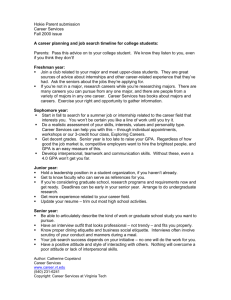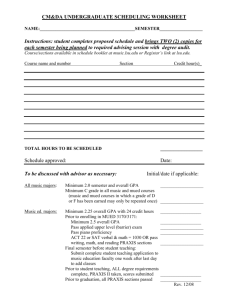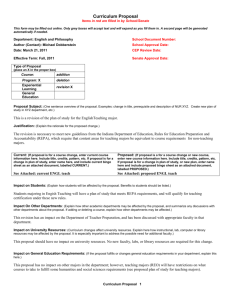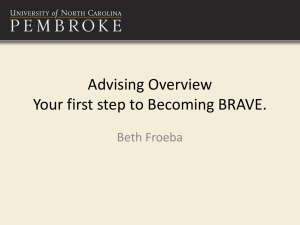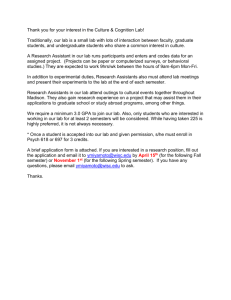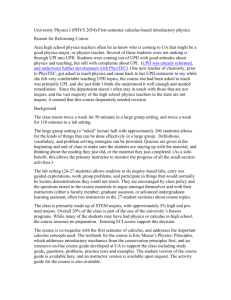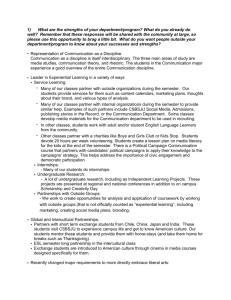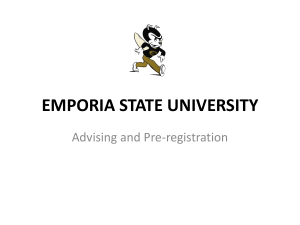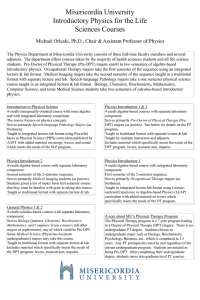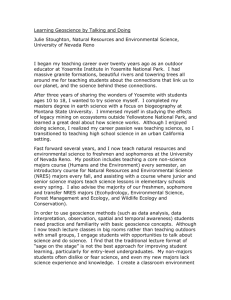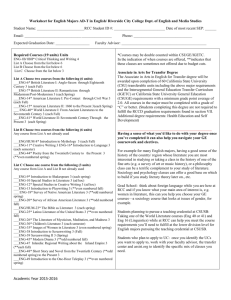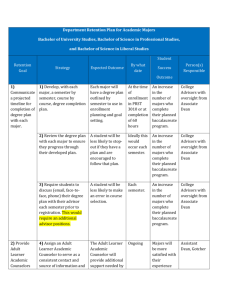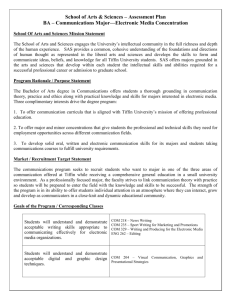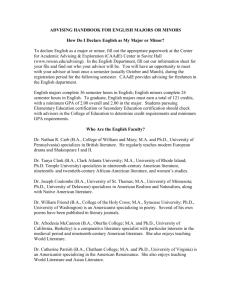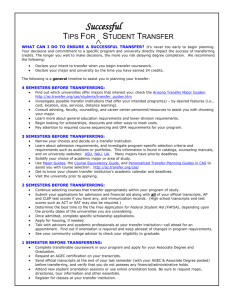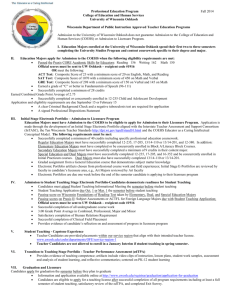October 12, 2015
advertisement
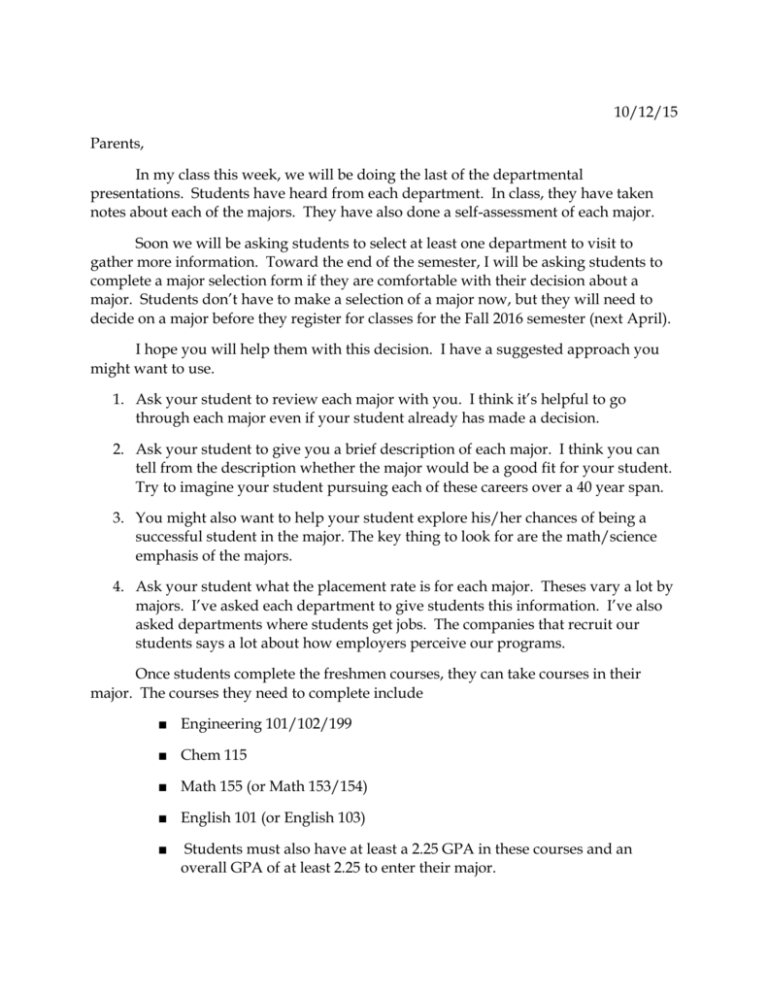
10/12/15 Parents, In my class this week, we will be doing the last of the departmental presentations. Students have heard from each department. In class, they have taken notes about each of the majors. They have also done a self-assessment of each major. Soon we will be asking students to select at least one department to visit to gather more information. Toward the end of the semester, I will be asking students to complete a major selection form if they are comfortable with their decision about a major. Students don’t have to make a selection of a major now, but they will need to decide on a major before they register for classes for the Fall 2016 semester (next April). I hope you will help them with this decision. I have a suggested approach you might want to use. 1. Ask your student to review each major with you. I think it’s helpful to go through each major even if your student already has made a decision. 2. Ask your student to give you a brief description of each major. I think you can tell from the description whether the major would be a good fit for your student. Try to imagine your student pursuing each of these careers over a 40 year span. 3. You might also want to help your student explore his/her chances of being a successful student in the major. The key thing to look for are the math/science emphasis of the majors. 4. Ask your student what the placement rate is for each major. Theses vary a lot by majors. I’ve asked each department to give students this information. I’ve also asked departments where students get jobs. The companies that recruit our students says a lot about how employers perceive our programs. Once students complete the freshmen courses, they can take courses in their major. The courses they need to complete include ■ Engineering 101/102/199 ■ Chem 115 ■ Math 155 (or Math 153/154) ■ English 101 (or English 103) ■ Students must also have at least a 2.25 GPA in these courses and an overall GPA of at least 2.25 to enter their major. Two of our departments will have a cap on the number of students they will accept. The two departments are Petroleum and Biomedical Engineering. The caps are necessary because of the ability of the program to accommodate the students. GPA will be a major consideration in the acceptance criteria. Some students may be able to take courses in their major next semester if they have exceptional grades and if they have completed all of the above requirements except for Eng’r 102. I have gone over this in class, and your student’s advisor will also make students aware of this option. In most cases, students will need each of the above courses to enter a major. Students will be able to take Eng’r 102 online in the Summer if they have completed the prerequisites. In most cases, students will take 3-4 hours of course work in their major their first semester sophomore year. Should a student decide a major isn’t a good fit, they can still change majors after the Fall 2016 semester without a lot of lost credits. Students who change majors after their first semester sophomore year are likely to lose more credits and could probably extend their college time by a semester. Thus your student’s decision about the correct major can have a major impact on your college costs. Some principles that I think are important in the selection of a major include: 1. Select a major that allows you to do a variety of things. Student’s interests will change over time and they need a flexible degree. 2. Don’t be overly swayed by idealized notions of what you do in a major. 3. Pick a major based on your personal interests not pay, location, etc. 4. Don’t make a choice based upon what you don’t want to do. Often these negative decisions are based upon false premises. 5. Don’t let short term financial factors (e.g. academic common market) unduly influence the decision on a major. There are other ways to finance college (e.g. co-ops, internships). I hate to see a student lock themselves into a load career fit because of a short-term financial need. I’ve gone over these principles in class, but reinforcement from you can help. One other thing that I recommend that students do is to talk to other students in the majors they are interested in. Student experiences can provide very useful unvarnished information about departments. Let me close with the story of John. I first met John on a late Friday afternoon. He wanted to transfer from an animal science major to our college. I helped him get his new schedule and showed him what courses would transfer. At the end of our meeting, I asked John why he was transferring. This was not a transfer pattern that I had experienced before. John told me (Caution: What follows is my best effort to sanitize his description). He just had a lab class where he was required to collect semen from a ram. Suffice it to say that the ram missed the bottle that John had in his hand and hit John in the face instead. That was enough for John. Over the next three years, I spent a lot of time with John on his career path. He came from a family roofing and sheet metal business. John’s decision was whether to join the family business or establish his own career direction. John decided to go his own career. Unfortunately John didn’t have a choice. The family business was failing and John had to assume responsibility for the business. His father was no longer able to manage the business. So at age 22, John was saddled with the family business and his parent’s economic survival. Today the family business is one of the largest of its type in America. John has asked me to find the future management team from our current students to help sustain the business for generations to come. The business is now in several states and each location is managed by a WVU grad. I’m a big believer in fate as it relates to careers. Fate will present opportunities and if realized will lead to amazing careers. But students need to capitalize on the opportunities, even when the opportunity involves going beyond a personal comfort zone. Every graduate from our program has a career story to tell. (Maybe not as gross as that of John’s) but the critical aspects in all of these stories is - Find a career that will sustain you for your entire life span Find a career where you can be a success Make the most of every opportunity Have faith that things will work out. The decision that your student will make in the next few weeks will be one of those life defining decisions. I hope they really give this a lot of thought.


